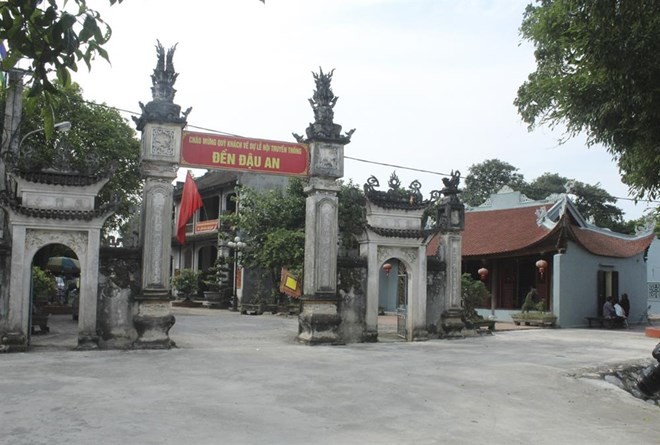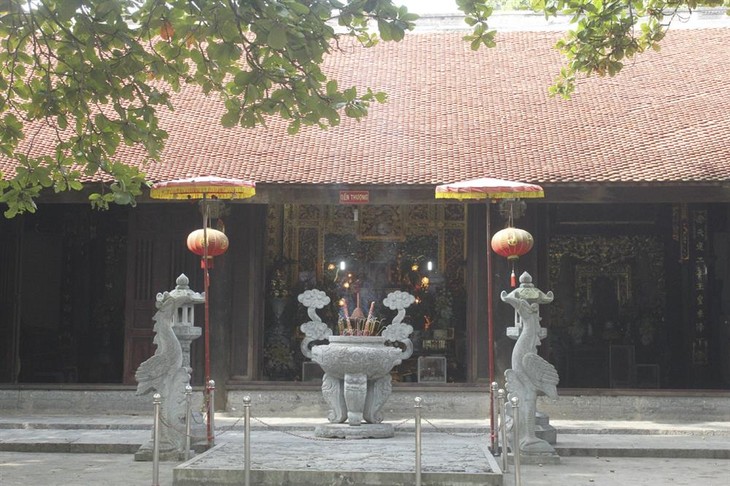(VOVWORLD) - An Xa Temple, also called Dau An Temple, in the northern province of Hung Yen is the largest architectural work of Taoism in Vietnam. The temple, which has historical and cultural importance as an imprint of early Taoist culture, has been designated a Special National Relic.
 The gate of Dau An temple in Hung Yen province (photo: laodong.vn) The gate of Dau An temple in Hung Yen province (photo: laodong.vn) |
An Xa Temple in An Xa hamlet was built to worship the Jade Emperor and fairies, who were credited with cultivating the wild swamp, exterminating the beasts, teaching people to plow, setting up villages, and building the "Thuy Ung Quan" shrine to pray for favorable weather and good harvests.
Tran Thoai, a member of the An Xa Temple Relics Management Board, said: “In the past, the temple was just a shrine made of Alang grass, rattan, and leaves. It was called Thuy Ung Quan, which means a shrine to pray for good things. People from all walks of life came to pray for blessings, wealth, and good fortune. During the Dinh, Ly, Tran, and Le dynasties, the temple was restored. The relic complex has the Thuong (Upper) Temple, Ha (Lower) Temple, Mandarin Temple, and Co (Young Lady) Temple. The Thuong Temple is the most typical structure.”
An Xa Temple is surrounded by a beautiful landscape. What makes it unique and special compared to other architectural works is that two of its structures (the Ong muong and Hau Cung) are made entirely of monolithic green stone that very few ancient relics in the north have. All decorative motifs and patterns on the structures were meticulously carved by skilled stone sculptors.
Tran Thoai said: "The outer hall is built mainly of ironwood, while the inner hall is made of stone. All columns and rafters are made of stone and carved with unicorns, lions, and dragons hovering over clouds. The Forbidden Chamber has doors on either side, which are not open to visitors. In the Forbidden Chamber is a terracotta incense burner on a lotus, a symbol of Buddhism.”
 In front of the main worship hall of Dau An temple (photo: laodong.vn) In front of the main worship hall of Dau An temple (photo: laodong.vn) |
An Xa Temple’s aesthetic value resides in the rare antiques and national treasures kept at the relic site. Among them are the terracotta altar (from the 16th to 17th century) and the terracotta tower (from the 6th to 17th century). Other valuable artifacts are two terracotta statues from the 16th or 17th century, a stone musical instrument from the later Le dynasty (1676), bronze bells from Le Canh Hung's 34th year (1773), and statues from the 18th century.
These are priceless cultural heritages and valuable historical sources for researchers studying relics and worship customs. Cultural researcher Professor Tran Lam Bien says the tower here is different from Buddha towers. Buddha towers usually have an odd number of storeys, but the tower here has 10 storeys. On the tower, they have found engravings of people’s wishes that show the convergence of spiritual beliefs and agricultural needs.
“The tower retains many patterns and decorations that not only beautify the tower but express the soul of the Vietnamese people and their request to the Jade Emperor: bestow favors on human beings,” Mr. Bien said.
For its outstanding architectural and artistic value, An Xa Temple was designated a Special National Relic Site in 2020 by the Prime Minister. An Xa’s terracotta tower was recognized as a National Treasure in 2021 and its terracotta altar was recognized as a National Treasure in 2022.
To promote the value of An Xa temple, the authorities of Hung Yen province have asked functional agencies and Tien Lu district to strengthen management and preservation work.
Tran Quoc Van, Chairman of the Hung Yen provincial People's Committee, said: “Functional agencies should effectively implement the program on preservation and promotion of the cultural and historical relic site, in association with tourism development in the 2020-2025 period, with a vision to 2030. The main task is to build a system of relic sites in the district, including An Xa Temple, and turn the temple into a tourism site.”